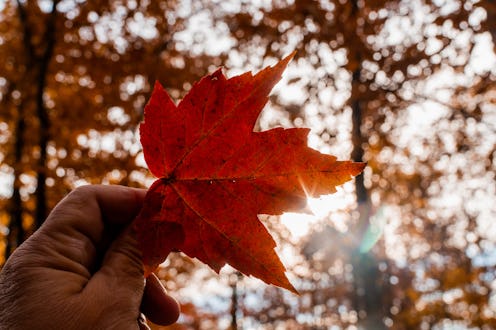Life
How Your Body Changes In The Fall

Like countless other people, I'm beyond ecstatic that fall has finally arrived. Full disclosure: I'm not a huge fan of the pumpkin spice latte (go ahead and judge me — everyone else has), but other than that, fall is my favorite season. I mean, what's not to love? The temperature is perfect (especially after that sweltering summer heat), the foliage is too pretty for words, and there's a crispness in the air that just makes me feel energized. Plus, fall brings us Halloween (aka the most fun holiday ever) and it allows me to finally break out my favorite wardrobe items, like boots and sweaters.
While we're busily focusing on our favorite aspects of fall — whether they're football season, picking out a Halloween costume, or drinking that darn pumpkin spice latte every day — our bodies and minds are undergoing all sorts of interesting changes that affect everything from our sleep to our social and sexual behaviors. Some of them are subtle and we may have never noticed them before, but others will probably sound pretty familiar.
So, what happens to your body when the seasons change? Here are six mental, physical, and social changes that can be attributed to autumn (not included: your blood eventually turning to pumpkin spice flavoring):
1. Your Heart Rate Speeds Up
When the temperature drops, your blood vessels constrict to conserve heat. This causes your blood pressure to rise. Typically, the rise is only minimal and it's nothing to worry about, health-wise. But if you have hypertension, look into some healthy ways to control high blood pressure and make sure to keep your doctor in the loop.
2. You May Sleep More Hours Per Night, But Wake Up Groggy
Hypersomnia, which is the opposite of insomnia, is most common during the fall months. In fact, during October, most people sleep about 2.7 hours more per day than they do in other months. But the quality and depth of your sleep will often not be as high as it is during the rest of the year, and you may end up feeling consistently sleepy during the day despite catching so much shut-eye. This is because the shorter days equal less exposure to sunlight, and sunlight hitting your retinas is part of what sets up healthy circadian sleep rhythms.
3. Love Is In The Air
If you've found that your libido rises when the fall months arrive, you're not alone. Several studies have tracked male and female hormone levels throughout the year, and it turns out testosterone and estrogen levels are highest in autumn. It's unclear whether this libido increase is due to ancient mating rituals (old habits die hard), or situational factors like decreased daylight, but either way, you might as well enjoy it! Another fun fact: November and December are our most fertile months. So if you're trying to get pregnant, you'll really want to get busy in the fall. And if you're aiming for the opposite, November and December are definitely the months when you don't want to be accidentally skipping doses of birth control.
4. You'll Want To Socialize... Via The Phone
When the darkness is combined with either rainy or cold weather, many of us are less likely to venture out to social gatherings, parties, or bars. But that doesn't mean we don't want to keep in close contact with our family and friends. Research shows that once Daylight Savings Time goes into effect and the nights get longer, people begin to spend more time on the phone with a select few contacts, like our best friends and closest family members.
5. You're More Likely To Become Dehydrated
In the hot summer months, we're all aware that we need to keep a water bottle close by to keep ourselves hydrated. Plus, the heat makes many of us dizzy and thirsty, so we crave a cold glass of water. We often don't feel the same thirst as the weather cools down — and that's exactly why we're more at risk of becoming dehydrated when the temperature drops.
Many of us stop drinking the amount of water that we need to stay properly hydrated, because our body isn't giving us the same harsh reminders it did during that August heat wave. Plus, as the temp drops, we tend to chug diuretic drinks like coffee and tea, and those cause additional dehydration on their own. So remember to keep your water bottle on hand even when it cools down — and drink that H2O even if you don't feel desperately thirsty (you can have another hot cider after you finish your bottle of water, OK?).
6. Your Memory May Improve
When November and December arrive bearing snow, wind and temperatures that are considerably less desirable than those that make us love September and October, it's a real downer. But at least there's an upside! When the weather gets bad, studies have shown that our memories improve and we have better recall than we would have on a warm, sunny day. Plus, cold and rainy days are great for our concentration and productivity as well. So as you bid farewell to October and brace yourself for the cold months ahead, that's one upside... right?
Happy Autumn! Enjoy all it has to offer before December plunges us into doom, gloom and mounds of snow (that we will apparently have perfect recall of).
Images: Marcia Straub/Moment/Getty Images; Giphy (6)